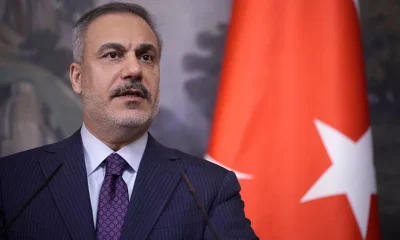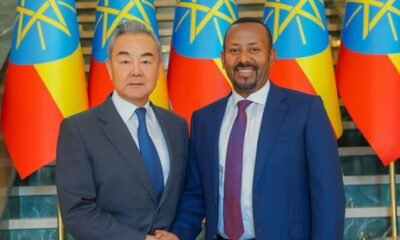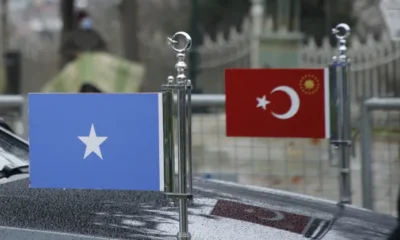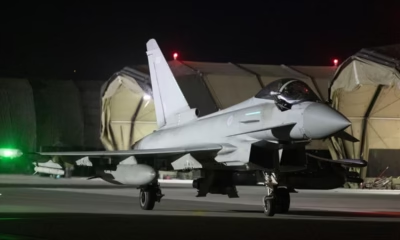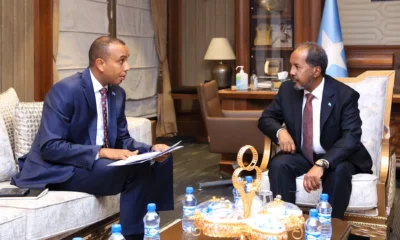Terrorism
Puntland Forces Strike Major Daesh Strongholds in Bari Region

Eight Daesh bases destroyed, drones downed in intense operations targeting militants in the Al-Miskaad mountains.
Puntland’s defense forces have launched a decisive offensive against Daesh militants in the Al-Miskaad mountains of the Bari region, dismantling critical strongholds and disrupting operations in the area. The operation, which targets militant positions, underscores Puntland’s commitment to eradicating extremist groups entrenched in its territory.
The Puntland Marine Police Force (PMPF) announced the destruction of at least eight key Daesh command centers and bases across strategic locations, including streams and mountainous regions such as Lugele, Dhabanacado, Il-Ameyro, Hoobato, Tagtag, and Baal-Gorey. These areas have long served as fortified hubs for extremist activity, complicating counterterrorism efforts in the region.
In a significant development, Puntland forces also shot down drones reportedly used by Daesh for reconnaissance and operational planning. Images of the downed drones, described as spy aircraft, highlight the group’s increasing reliance on technology to bolster its activities.
The operation yielded additional gains, with Puntland forces recovering weapons and ammunition abandoned by retreating militants. However, the situation remains volatile, with opposing movements and clashes continuing in key locations such as the Toga Il-Ameyro area.
Puntland’s campaign to liberate the mountainous Bari region reflects a broader strategy to reclaim territories controlled by extremist groups. These efforts are critical in addressing the persistent security threats posed by Daesh and ensuring stability in the region.
The success of this offensive will be closely monitored as Puntland seeks to dismantle Daesh’s operational network and prevent the group from regrouping in the strategically significant Al-Miskaad mountains.
Terrorism
UK–France Bomb ISIS Tunnels Near Palmyra as Syria Becomes Active War Zone Again
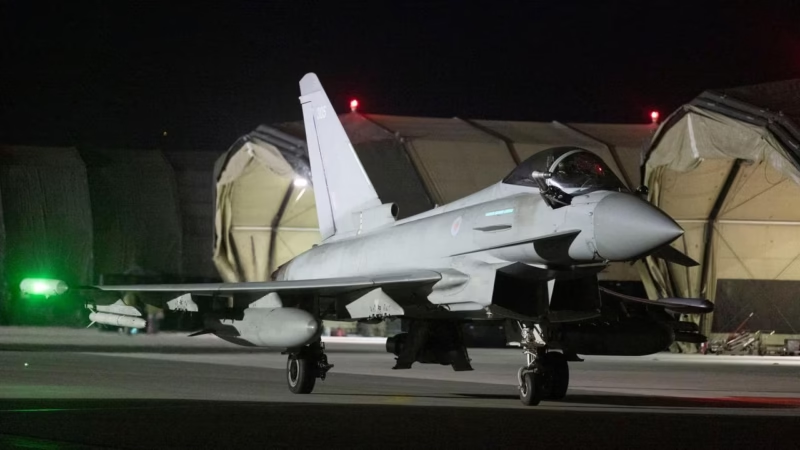
ALLIES STRIKE BACK: UK– UK and France Carry Out Joint Airstrike on Suspected ISIS Weapons Facility in Central Syria.
The United Kingdom and France have carried out a coordinated airstrike on a suspected Islamic State weapons complex in central Syria, signaling that Western powers are once again prepared to use force to prevent ISIS from exploiting regional chaos.
According to the UK Ministry of Defence, Royal Air Force Typhoon FGR4 jets, operating alongside French aircraft, struck an underground facility north of Palmyra on Saturday evening. The target, buried in the rugged terrain of Syria’s Homs province, was believed to be used by ISIS to store weapons and explosives. Precision-guided Paveway IV bombs were used to collapse access tunnels, with British Voyager tankers supporting the operation in midair.
Initial battle damage assessments suggest the strike was successful, though full confirmation is still pending.
The timing matters. The operation comes amid heightened U.S. military activity in Syria and reflects growing concern that ISIS is quietly regenerating in the vacuum created by fractured Syrian authority, Iranian repositioning, and shifting U.S. priorities across the Middle East.
UK Defence Secretary Sir John Healey framed the strike as a clear message: Britain will not allow ISIS to resurface. “This operation demonstrates our determination to prevent any resurgence of Islamic State and to stand shoulder to shoulder with our allies,” he said, underscoring London’s commitment to the U.S.-led Global Coalition to Defeat ISIS.
That coalition may no longer dominate headlines, but it is far from dormant. U.S. Central Command has repeatedly warned that ISIS remains an “active and persistent threat,” particularly in central and eastern Syria. In December, U.S. forces launched large-scale strikes across the same region after an ISIS ambush near Palmyra killed two American troops and a civilian interpreter.
The Palmyra corridor has become a familiar flashpoint. Once a symbol of ISIS’s brutal rise, the area now serves as a reminder of how easily extremist groups can reconstitute when state control weakens and international attention drifts.
This latest strike also reflects a broader Western recalibration. With Washington simultaneously escalating pressure on Iran, reshaping its posture in Syria, and signaling a harder line across multiple theaters, European allies appear determined not to be sidelined. The UK–France operation reinforces a message of alignment: counterterrorism remains a shared priority, even as global focus shifts to great-power competition.
For ISIS, the implication is blunt. The group may be quieter, more fragmented, and less territorial than at its peak—but it is still being watched, tracked, and hit.
For Syria, the reality is harsher. Nearly a decade after ISIS’s defeat as a “state,” the country remains a battlefield where foreign airpower can strike at will, and where stability is still fragile enough to allow extremist cells to survive underground.
The war against ISIS, it seems, never truly ended. It merely went subterranean.
Somaliland
Houthis Threaten Somaliland After Israel Recognition

Yemen’s Iran-backed Houthi movement has issued a direct threat following Israel’s historic recognition of Somaliland, warning it would treat “any Israeli presence in Somaliland as a military target.”
In a speech broadcast Sunday by the Houthi-run Saba News Agency, the group’s leader Sayyed Abdulmalik al-Houthi accused Israel of seeking the “disintegration and fragmentation of other countries” and framed the recognition as a threat to both Somalia and Yemen.
“We emphasize our firm stand with the brotherly Somali people against Israel,” al-Houthi said, adding that the Houthis would take “all possible support measures” in response. He ended by calling on Yemenis to rally behind the Palestinian cause, claiming failure to do so would open the door to what he described as Israeli “conspiracies” worldwide.
The warning comes days after Israeli Prime Minister Benjamin Netanyahu formally recognized the Republic of Somaliland as an independent and sovereign state, making Israel the first UN member country to do so. Netanyahu said the move was made “in the spirit of the Abraham Accords,” launched under former US President Donald Trump.
Somaliland has functioned as a separate, stable state since 1991, following the collapse of Somalia, and has maintained peace, democratic elections, and internal security for more than three decades. Mogadishu has consistently lobbied international actors to block recognition of Somaliland.
Hargeisa views Israel’s decision as a diplomatic breakthrough that could encourage other nations to follow, expanding Somaliland’s international standing and access to global markets. The Houthi threat now underscores the wider regional stakes, as Red Sea tensions and Middle East conflicts increasingly intersect with the Horn of Africa’s shifting geopolitical landscape.
Houthis Threaten Global Stability: How Long Can the World Ignore Them?
Terror and Exploitation: The Dark Role of the Houthis’ Female Brigade
The Secret Maritime Corridor Linking Yemen’s Houthis to Somalia’s Militants
Terrorism
UN Experts Warn Al-Shabab Remains the Greatest Threat to Peace in Somalia and East Africa

UN Alarm: Al-Shabab’s Power Undiminished as Somalia and Kenya Face Escalating Threat.
Al-Shabab remains the single most serious threat to peace and stability in Somalia and the wider region, particularly Kenya, according to a new report by United Nations experts that underscores how resilient the al-Qaida-linked group has become despite years of military pressure.
In findings released Wednesday, the panel said that sustained operations by Somali forces and international partners have failed to significantly degrade the group’s operational capacity. Al-Shabab, the experts concluded, retains the ability to plan and execute complex, asymmetric attacks across Somalia, including in heavily fortified areas of Mogadishu.
The attempted assassination of President Hassan Sheikh Mohamud on March 18, carried out near the capital, was cited as evidence of the group’s continued reach and intelligence penetration.
But the threat posed by al-Shabab extends far beyond headline attacks. The report highlights the group’s sophisticated system of extortion, forced recruitment, and propaganda, which together provide a steady flow of revenue, fighters, and ideological influence. These mechanisms, the experts said, allow the organization to regenerate even as it loses fighters on the battlefield.
The warning comes as the U.N. Security Council unanimously voted this week to extend the mandate of the African Union’s support and stabilization mission in Somalia through Dec. 31, 2026. The force, comprising nearly 12,000 uniformed personnel including police units, remains central to efforts to contain the insurgency. Yet the report suggests that military containment alone has not broken al-Shabab’s strategic momentum.
Regionally, Kenya faces a persistent and evolving threat. The panel reported that al-Shabab continues to carry out a steady stream of attacks inside Kenyan territory, averaging about six incidents per month this year. Most have occurred in Mandera and Lamu counties along the Somali border and range from roadside bombings targeting security forces to kidnappings, infrastructure sabotage, home raids, and livestock theft. The pattern reflects a strategy aimed at destabilizing border communities while stretching Kenyan security resources.
At the core of al-Shabab’s campaign, the experts said, is an unchanged ideological objective: the overthrow of Somalia’s federal government, the expulsion of foreign forces, and the creation of a “Greater Somalia” uniting ethnic Somalis across East Africa under a hardline interpretation of Islamic rule.
The report also examined the growing footprint of Islamic State in Somalia. While far smaller than al-Shabab, ISIL-Somalia has expanded steadily, drawing recruits from across the region and beyond. By the end of 2024, the group was estimated to have more than 1,000 fighters, at least 60 percent of them foreign nationals. Though limited in resources, the panel warned that its expansion represents a serious and compounding security risk.
Taken together, the findings paint a sobering picture: Somalia’s militant landscape is not shrinking but diversifying, with al-Shabab still dominant and rival extremist groups gaining ground. Without stronger political cohesion, financial disruption of militant networks, and regional coordination, the experts warn, the threat to Somalia and its neighbors is likely to endure.
Somaliland
Profiling Yusuf Shaacir: The Anatomy of an Extremist Inciter

INTELLIGENCE DOSSIER: Yusuf Osman Abdulleh (Yusuf Shaacir) – The Anatomy of an Extremist Inciter.
Subject: Yusuf Osman Abdulleh (aka Yuusuf Shaacir)
Status: High-Risk Extremist Agitator / Potential Terror Link
Location: Hargeisa, Somaliland
Role: Former Advisor to the House of Representatives (Somaliland); Member of Federal Govt. of Somalia Education Committee
Executive Summary: The Self-Appointed “Fighter”
This dossier profiles Yusuf Osman Abdulleh, known publicly as Yusuf Shaacir, a prominent and increasingly dangerous extremist voice operating within the political and social fabric of Somaliland. Born in the nomadic area of Burao (est. 1970) and lacking formal secular education, Yusuf has transformed from a cultural coordinator into a radicalized agitator.
He has self-appointed himself as a “fighter” for Islam, utilizing this persona to wage a dangerous campaign of incitement against civil society, women’s rights activists, and educational institutions.
Crucially, intelligence indicates that Yusuf is not acting alone. Security assessments suggest he has been radicalized and potentially funded by external actors to serve as a propaganda machine, with credible links pointing towards the Al-Shabaab terror network.
1. Radicalization Trajectory: From Culture to Extremism
Yusuf’s path to radicalization appears rooted in economic grievance and professional failure. Formerly affiliated with the Hargeisa Cultural Centre (HCC) as a coordinator for poets, he was dismissed following complaints from the artists he managed.
The Pivot: Post-dismissal, Yusuf pivoted from cultural work to hardline religious agitation. Intelligence sources indicate he was targeted for recruitment by individuals offering financial incentives to weaponize his anger.
The Narrative: He began systematically attacking his former employers, labeling the HCC and the Hargeisa International Book Fair as “secular” conspiracies designed to eradicate Islam from Somaliland. These allegations are unproven but are designed to incite public violence.
Proof of Rhetoric: In his latest speech, Yusuf explicitly declares himself to be “at war” with groups he deems a threat to religion.
2. The Threat Vector: Incitement and Violence
Yusuf’s primary weapon is the weaponization of Takfir (declaring others apostates). By labeling civil society leaders, authors, and human rights defenders as “anti-Islamic” or “atheists,” he is effectively marking them for death in a region where such labels can lead to extrajudicial killing.
Targeting Women: Women’s rights activists are a specific focus of his vitriol. One activist noted, “I am afraid that I might be killed on the streets of Hargeisa… When you are called anti-Islam and apostate, you become an easy target for every fanatic.”
Antisemitism: Yusuf propagates virulent antisemitic views. His Facebook posts against Jewish visitors to Hargeisa framed them as dangerous elements, forcing their evacuation to avoid attack. This rhetoric directly feeds into the narratives of global extremist groups. Evidence of Antisemitic Posts
Education as “Haram”: Mirroring the ideology of Boko Haram, Yusuf attacks schools and universities, particularly those enrolling girls, viewing secular education as forbidden. He publicly appealed for the arrest of an individual posting about human biology, misrepresenting science as an attack on Islam.
3. Institutional Infiltration and Terror Links
The most alarming aspect of Yusuf’s profile is his successful infiltration of state institutions, granting his extremist views a veneer of legitimacy.
Former Advisor to Parliament: Despite his extremist rhetoric, the former Speaker of the House of Representatives, Abdirizak Khalif Ahmed, appointed Yusuf as an advisor on the Somali language. The Speaker’s failure to distance himself from Yusuf’s fanaticism raises serious security questions.
Former Federal Government Role: Yusuf also sits on a committee for the Ministry of Education of the Federal Government of Somalia, a dangerous position for an individual who opposes secular education.
Al-Shabaab Connection: Security experts and intelligence agencies investigating Yusuf believe there is a strong probability of a connection to Al-Shabaab, the Al-Qaeda affiliate responsible for scores of deaths in the region. His operational pattern—using social media to recruit youth and incite violence—aligns perfectly with the group’s recruitment strategy.
4. Digital Footprint and Evidence
Yusuf utilizes social media platforms to disseminate his hate speech, reaching audiences far beyond Somaliland.
Primary Channels:
Facebook Page: Abw.YuusufShaacir
Facebook Account: Yuusuf Shaacir Personal
Video Evidence of Extremist Speeches (Somali Language):
Speech 1: Declaration of War on Secularism
Speech 2: Incitement Against Civil Society
Speech 5: Targeting Individuals
Speech 6: Antisemitic Commentary
Facebook Video: Mobilization Call
Conclusion: A Clear and Present Danger
Yusuf Shaacir represents a critical threat to the peace and tolerance that are the hallmarks of Somaliland society. He is not merely a conservative critic; he is an active agent of radicalization, using the cover of state employment to legitimize a campaign of terror and incitement.
His actions violate Article 10 of the Somaliland Constitution and align with the UN definition of violent extremism. Immediate containment and legal action are required to dismantle the platform of this self-appointed “fighter” before his rhetoric converts into lethal action.
Comment
New Year’s Eve Terror Plot Stopped: FBI Says LA Was Hours From Coordinated Bombings

Officials say the plot was “credible,” coordinated, and ideological. What the FBI stopped in the California desert reveals how fast fringe movements can turn violent.
Federal authorities say they disrupted a planned New Year’s Eve terror attack in Southern California, arresting five individuals linked to a radical pro-Palestinian extremist cell accused of preparing coordinated bombings across the Los Angeles region. The case, now unfolding in federal court, underscores growing concerns among U.S. security agencies about the intersection of global political causes and domestic extremist violence.
According to law enforcement officials, four suspects were arrested last week in Lucerne Valley, a remote area of the Mojave Desert east of Los Angeles, where they were allegedly testing improvised explosive devices. A fifth suspect was taken into custody separately in New Orleans and is believed to be connected to the same network. Investigators describe the threat as “credible,” with evidence suggesting the group was moving from ideological planning to operational execution.
The four defendants charged in California — Audrey Ilene Carroll, 30; Zachary Aaron Page, 32; Dante Gaffield, 24; and Tina Lai, 41 — face federal counts including conspiracy and possession of an unregistered destructive device. Prosecutors allege the group intended to plant explosive devices at multiple sites across Los Angeles and Orange County, targeting at least five businesses identified as logistics or commercial centers, timed to detonate at midnight on New Year’s Eve.
Beyond the holiday plot, court filings indicate the suspects also discussed future attacks against U.S. Immigration and Customs Enforcement facilities and vehicles, including the use of pipe bombs early next year. In recorded communications cited by prosecutors, Carroll allegedly said such attacks would “take some of them out and scare the rest,” language that federal officials say highlights the group’s willingness to escalate violence against law enforcement.
The suspects are accused of belonging to an offshoot of the Turtle Island Liberation Front (TILF), a little-known but increasingly scrutinized group that blends pro-Palestinian activism with anti-government, anti-capitalist, and anti-law-enforcement ideology. According to the FBI, the defendants communicated through an encrypted Signal chat called “Order of the Black Lotus,” which one member reportedly described as “radical.” Investigators say searches of the suspects’ homes uncovered extremist propaganda, TILF-linked materials, and a detailed outline of the alleged attack plan.
Attorney General Pam Bondi described the arrests as the prevention of “a massive and horrific terror plot,” while FBI Director Kash Patel said the case illustrates how ideological extremism — particularly when paired with calls for “direct action” — can rapidly translate into domestic terrorism. Los Angeles Police Chief Jim McDonnell echoed that assessment, crediting inter-agency coordination with averting what he called a potential tragedy.
The case also complicates broader public debates around protest movements and political activism. While TILF publicly frames itself around decolonization, indigenous sovereignty, and Palestinian solidarity, federal officials argue the group’s rhetoric explicitly rejects peaceful protest and embraces violence as a necessary tool.
For U.S. authorities, the foiled plot serves as a warning rather than a conclusion. Investigators say the inquiry remains active, with efforts underway to determine whether additional individuals or cells were involved. As New Year’s Eve approaches, the arrests reinforce a stark reality: the most serious terror threats are not always imported — they can grow, organize, and arm themselves quietly at home.
Terrorism
AFRICOM UNLEASHED: ISIS AND AL-SHABAAB UNDER HEAVY FIRE

U.S. Airstrikes in Somalia Surge to Record 109 After New Operations in Puntland and Jubaland.
U.S. military activity in Somalia has reached unprecedented levels, with seven new airstrikes conducted in late November and early December pushing the annual total to at least 109 strikes—the highest ever recorded in the country’s history.
The latest operations targeted ISIS-linked militants entrenched in the remote mountains of Puntland and an al-Shabaab position in Jubaland, underscoring Washington’s intensifying counterterrorism focus across Somalia’s fractured north and south.
According to U.S. Africa Command (AFRICOM), the first series of strikes hit militant hideouts on Nov. 26, 27 and 28 in a rugged zone approximately 37 miles southeast of Bosaso.
Additional strikes followed on Dec. 1, 2 and 3 in the same mountainous region, an area long known for its complex cave networks that ISIS fighters have used to evade Somali and U.S.-backed security forces.
A separate Dec. 3 strike targeted an al-Shabaab site near Kobon in southern Jubaland. AFRICOM released no casualty figures and provided no information on aircraft platforms or weapons employed.
The escalation comes shortly after AFRICOM commander Gen. Dagvin Anderson visited Puntland, pressuring regional authorities to widen their campaign against ISIS elements operating outside Mogadishu’s political reach.
Unlike other Somali regions, Puntland maintains semi-autonomous structures and has been one of the main local partners for U.S. counterterror missions—cooperation strengthened precisely because it bypasses the federal government.
This year’s total far exceeds earlier peaks. Under President Donald Trump, AFRICOM conducted 63 airstrikes in 2019 and 219 across his first four-year term. President Joe Biden approved 51 strikes over four years, according to the New America Foundation.
President Barack Obama authorized 48 over eight years. The 2024 tally therefore marks a dramatic acceleration, reflecting a renewed U.S. willingness to strike militant networks aggressively ahead of their anticipated expansion into coastal and urban zones.
Washington’s involvement in Somalia stretches back decades, but its modern counterterror strategy crystallized after the 2006 U.S.-backed Ethiopian intervention that toppled the Islamic Courts Union. Al-Shabaab emerged from that upheaval, launching its first major suicide attack the same year.
Somalia’s ISIS branch formed later, in 2015, after a faction of al-Shabaab broke away and pledged loyalty to the Islamic State—anchoring itself in Puntland’s mountains, where Somalia’s fragmented governance has enabled militant entrenchment.
The surge in U.S. strikes now signals a deeper strategic concern: both Islamic State and al-Shabaab elements are adapting, exploiting ungoverned spaces while Mogadishu remains engulfed in internal political turmoil.
For Washington, the Red Sea corridor’s volatility makes Somalia’s militant networks more than a local threat—they are a regional accelerant at a time when global trade routes face cascading instability.
Terrorism
New Intelligence Confirms Houthi Support to ISIS in Somalia

WARYATV Exclusive: The Terror Partnership No One Saw Coming.
Intelligence obtained exclusively by WARYATV reveals a dramatic escalation in regional security threats, as a new confidential report confirms that Yemeni Houthi forces have been providing direct military and technical assistance to ISIS militants operating in Somalia.
This emerging alliance—bridging a Middle Eastern insurgent movement and one of Africa’s most dangerous terrorist groups—marks a profound shift in the operational landscape of jihadist networks across the region.
According to the report, ISIS fighters in Somalia have received specialized training from Houthi operatives in areas such as intelligence gathering, drone construction, and the deployment of explosive-equipped unmanned aerial systems.
These capabilities have played a decisive role in ISIS’s ongoing insurgency in Puntland, where the group has waged a grinding war for more than a year without decisive defeat.
Security officials say the first major sign of this partnership surfaced early in the conflict, when ISIS began deploying small, weaponized drones—far more sophisticated than anything previously documented in Somalia.
These drones have killed and injured Puntland security personnel, destroyed military vehicles, and allowed ISIS to conduct persistent surveillance over troop positions.
The report concludes that such capabilities were “beyond the technical reach of ISIS prior to direct external assistance,” indicating a structured training pipeline.
WARYATV previously uncovered indications of covert cooperation between jihadist groups such as Al-Shabaab, Al-Qaeda, ISIS, and Yemeni Houthi factions.
The Secret Maritime Corridor Linking Yemen’s Houthis to Somalia’s Militants
The new intelligence confirms that these links have evolved into a more formalized partnership—one that risks shattering regional security balances and opening new fronts in the Horn of Africa.
The strategic danger is clear: a multi-national extremist ecosystem is emerging, able to transfer technology, expertise, and battlefield tactics across borders.
Such collaborations amplify the lethality of each group individually and create a resilient network capable of adapting to military pressure.
The growing concern has reached international military leadership. AFRICOM Commander Gen. Dagvin Anderson—who recently toured Ethiopia, Somaliland, and Puntland—issued his own warning.
The United States, he said, is increasingly alarmed by the security trajectory in the Horn of Africa and views strengthened cooperation with Somali security forces as essential to countering shared threats.
General Anderson emphasized that AFRICOM intends to deepen intelligence coordination and counterterrorism support, highlighting the need for regional governments to unify against emerging hybrid militant alliances.
The confidential report’s conclusion is stark: if the Houthi–ISIS operational pipeline is not disrupted, the Horn of Africa could face the most technologically capable and internationally networked terrorist threat in its modern history.
US Deepens Security Ties with Puntland in Counter-ISIS Campaign
AFRICOM Chief Reports Surge in Islamic State Fighters in Northern Somalia
Terrorism
Washington Goes Hardline — Antifa and Allies Under Federal Investigation

U.S. Attorney General Pam Bondi has directed federal law enforcement to intensify investigations into domestic extremist groups, including organizations associated with the anti-fascist antifa movement, according to an internal memo obtained by Reuters.
The directive marks one of the most sweeping expansions of domestic terrorism scrutiny in recent years, signaling a significant shift in the Justice Department’s priorities.
The memo, distributed Thursday to federal prosecutors and multiple law enforcement agencies, instructs the Justice Department to elevate cases involving suspected domestic terrorism and to pursue not only violent offenses but also potential financial crimes.
Bondi specifically asked investigators to examine “tax crimes” involving groups accused of defrauding the Internal Revenue Service, framing financial misconduct as part of a broader pattern of extremist activity.
“These domestic terrorists use violence or the threat of violence to advance political and social agendas,” Bondi wrote in the memo, listing a broad set of ideological positions that she said required heightened attention.
Among them were opposition to immigration enforcement, “extreme views” supporting mass migration and open borders, as well as anti-capitalist, anti-American, or anti-Christian sentiments. She argued that these ideologies could serve as a gateway to violence or organized disruption.
Bondi ordered the FBI’s Joint Terrorism Task Forces to prioritize investigations into such groups and to coordinate closely with prosecutors on potential charges.
She also directed federal law enforcement agencies to review their intelligence holdings and turn over any relevant material, particularly information involving antifa-aligned networks.
The memo represents a consolidation of long-running concerns within conservative political circles that left-wing groups pose an escalating threat to public safety.
Critics of the approach have argued that the definition of “extremism” risks becoming overly broad and could sweep up constitutionally protected political activity.
Supporters contend that the rise of politically motivated violence, regardless of ideology, requires a muscular federal response.
The Justice Department has not commented publicly on the memo, and it remains unclear how many active investigations may fall under the newly expanded mandate.
But Bondi’s directive suggests that federal authorities are preparing to take a far more aggressive posture toward groups they believe blur the line between political activism and unlawful conduct.
-

 Analysis10 months ago
Analysis10 months agoSaudi Arabia’s Billion-Dollar Bid for Eritrea’s Assab Port
-

 Opinion17 years ago
Opinion17 years agoSomaliland Needs a Paradigm Change: Now or Never!
-

 Interagency Assessment4 weeks ago
Interagency Assessment4 weeks agoTOP SECRET SHIFT: U.S. MILITARY ORDERED INTO SOMALILAND BY LAW
-

 Somaliland3 months ago
Somaliland3 months agoSomaliland Recognition: US, UK, Israel, and Gulf Bloc Poised for Historic Shift
-

 EDITORIAL1 year ago
EDITORIAL1 year agoDr. Edna Adan Champions the Evolving Partnership Between Somaliland and Ethiopia
-

 ASSESSMENTS10 months ago
ASSESSMENTS10 months agoOperation Geel Exposes the Truth: International Community’s Reluctance to Embrace Somaliland as a Strategic Ally
-

 Somaliland12 months ago
Somaliland12 months agoSomaliland and UAE Elevate Ties to Comprehensive Strategic Partnership
-
Top stories2 years ago
Ireland, Norway and Spain to recognize Palestinian state






